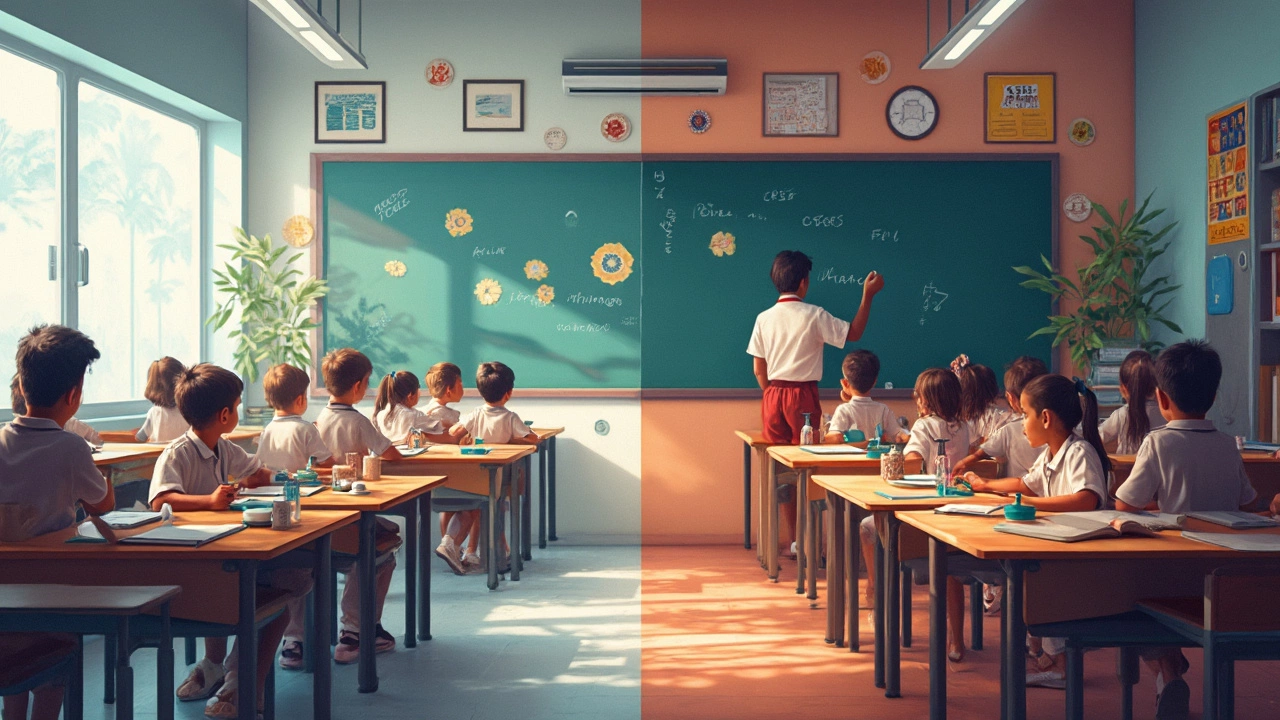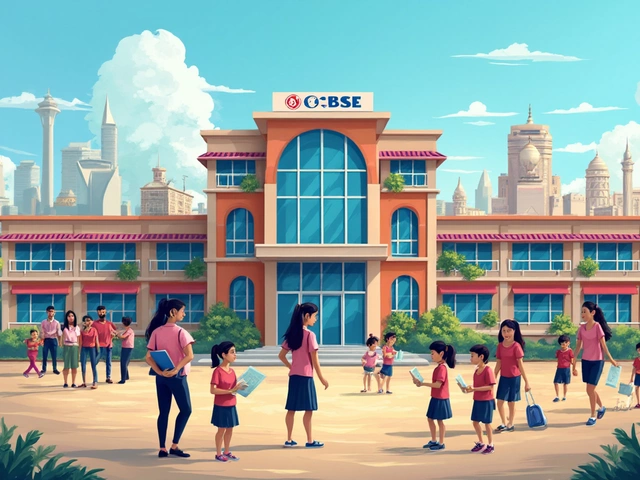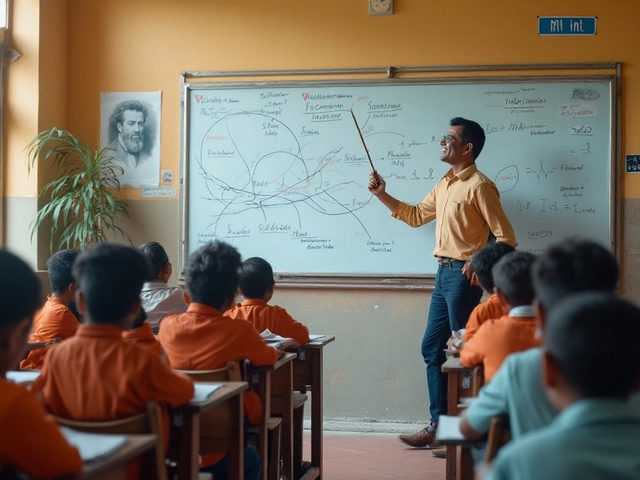
When it comes to picking the right place for education following the CBSE syllabus, parents often find themselves torn between Dubai and India. This choice boils down to several factors like teaching quality, facilities, and overall student environment.
Dubai's education scene is all about offering a multicultural experience alongside top-notch resources. With schools funded generously and a diverse array of international students, there’s a focus on creating a global citizen. However, this doesn't mean it's perfect for everyone.
India, on the other hand, is home to a myriad of CBSE schools both urban and rural, emphasizing strong foundational learning. The familiarity and structured environment might be what some families are after, offering a sense of tradition paired with academic rigor.
- CBSE Syllabus Explained
- Dubai's Educational Landscape
- India's Education System
- Learning Environment: Dubai vs. India
- Parental Insights and Tips
- Final Thoughts on Choosing Between Dubai and India
CBSE Syllabus Explained
The CBSE syllabus is known for its structured approach, focusing on a deep understanding of core subjects like Science, Mathematics, Social Studies, and Languages. The Central Board of Secondary Education (CBSE) aims to create a robust foundational framework that prepares students for competitive exams and higher education.
Core Framework
CBSE's courses are designed to minimize rote learning and emphasize analytical skills. Subjects are standardized across the board, ensuring consistency in education whether a student is in Dubai or India.
- Science and Mathematics: These subjects focus on practical applications, promoting problem-solving abilities through lab work and assignments.
- Languages: From English to Hindi and local languages, CBSE emphasizes language skills, gearing students for a global stage.
- Social Studies: Encourages the understanding of history, geography, and civics, providing a well-rounded education.
Assessment and Evaluation
The evaluation process in CBSE is a mix of periodic tests, term examinations, and projects. This not only ensures comprehensive learning but also helps students manage stress by spreading assessments throughout the year.
| Grade Level | Main Focus |
|---|---|
| Primary | Basic language skills, numeracy, and environmental studies. |
| Middle School | Introduction to Science and Social Studies, with a growing emphasis on Mathematics. |
| High School | In-depth focus on core subjects preparing for board exams. |
This consistent approach makes the CBSE syllabus a preferred choice for parents who value a balanced yet challenging curriculum that can adapt across various educational landscapes, whether in Dubai or at home in India.
Dubai's Educational Landscape
Dubai has made headlines around the world for its impressive school system. It's a melting pot of cultures, thanks to families from all over the globe seeking top-notch Dubai education for their kids. This diversity is a huge plus in classrooms, offering students perspectives from everywhere.
When we talk about education in Dubai, it's impossible to ignore the investment in modern facilities. Schools often feature cutting-edge technology and resources that aim to enhance learning experiences. Interactive smartboards, state-of-the-art labs, and access to tablets and laptops make tech integration a big deal here. This can really appeal to those who want their kids to be tech-savvy right from the start.
Access to International Standards
What's really cool is that students in Dubai often have the option to follow international curriculums, alongside the CBSE syllabus. This means they get a blended education that opens doors to global opportunities. Plus, experienced teachers from various educational backgrounds enrich their learning journey.
Extracurricular activities are another area where Dubai's schools shine. From sports events to arts and cultural activities, there's a wide array for students to choose from. This balanced approach encourages not just academic growth but also personal development. Parents often look at this aspect to ensure their children become well-rounded individuals.
Challenges and Considerations
As great as it sounds, there are a few things to consider. One biggie is the cost. High-quality Dubai education doesn't come cheap. Tuition and other expenses can add up quickly, so it's crucial for families to plan their budgets accordingly.
Still, the benefits of an education in a city like Dubai can be compelling. With access to advanced infrastructure, an international mix of peers, and an inclusive environment, students can thrive in many ways. It’s no wonder many families choose to make the move.
| Key Factors | Details |
|---|---|
| Diversity | Over 200 nationalities, creating a multicultural learning environment. |
| Technology | Extensive use of smart tools and devices in classrooms. |
| Tuition Costs | Can range from moderate to high, depending on the school. |
| Extracurriculars | Wide variety including sports, arts, and cultural programs. |
India's Education System
India's education system is known for its huge network of schools, especially those affiliated with the CBSE syllabus. This setup ensures that students all over the country have access to a standardized form of education, which focuses on foundational learning and preparation for competitive exams.
The CBSE syllabus is designed to be comprehensive and systematic. It covers a variety of subjects like Science, Mathematics, and Social Studies, emphasizing understanding over rote memorization. This approach aims to develop analytical and reasoning skills in students, preparing them for further studies and competitive exams that are a hallmark of Indian education.
Strengths of the CBSE Affiliation
A major advantage of studying in a CBSE school in India is the access to resources aimed at nurturing student growth. These schools often have experienced teachers who are adept at preparing students for national and international competitive exams, such as the IIT-JEE and NEET.
Moreover, CBSE schools emphasize continuous evaluation. Instead of just one big exam at the end of the year, students are assessed through periodic tests, projects, and assignments. This helps in reducing exam stress and allows for a more comprehensive evaluation of a student's skills.
Cost and Accessibility
Education in India, particularly in publicly funded schools, is known to be more affordable compared to international schooling options. However, there are also private CBSE schools that might charge higher fees based on location, facilities, and reputation.
| Aspect | Details |
|---|---|
| CBSE Schools | Over 21,000 in India |
| Student Enrollment | More than 20 million |
| Medium of Instruction | Primarily English and Hindi |
The focus on affordability and providing quality education through improved infrastructure makes India a promising choice for many families. However, it's crucial for parents to weigh these tangible benefits against other factors unique to their child’s needs.

Learning Environment: Dubai vs. India
When evaluating the learning environment, both Dubai and India have their distinct qualities. In Dubai, schools often boast modern facilities with advanced technology at the center of its teaching methods. Classrooms are fitted with the latest interactive tools, providing a dynamic space for kids to learn and grow in a tech-savvy world.
Meanwhile, the educational vibe in India tends to be more traditional but with a strong academic core grounded in the CBSE syllabus. Many schools emphasize personal discipline and structured curricula, making sure students have a solid grasp of essential subjects.
Class Size and Diversity
Class sizes in Dubai are typically smaller, allowing for more personalized attention to students. This can be a huge benefit for kids who need extra guidance. Moreover, Dubai's international melting pot status means students often learn alongside peers from all over the world, providing them with a more global perspective.
In India, schools can have larger class sizes. On one hand, this can mean less individual attention, but it also fosters resilience and teamwork among students. India's diverse cultures bring their own rich educational experiences to the table, especially valuable in CBSE schools spread across various states.
Access to Extracurricular Activities
Extracurriculars are a big focus in Dubai's schools, nurturing talents beyond just academics. From sports to arts, students here can explore a wide range of interests. This exposure can be crucial in holistic development.
In India, while extracurriculars are present, the emphasis traditionally skewed towards academic achievements. However, urban schools, especially, are increasingly encouraging a balance with various clubs and activities.
Cost and Affordability
In Dubai, education can be quite costly with nearly every good school charging hefty fees. It reflects in the quality, but it isn't easy on everyone's pocket.
Conversely, India offers a range of options from affordable to elite, allowing parents to choose based on their financial situation without sacrificing educational quality.
| Aspect | Dubai | India |
|---|---|---|
| Class Size | Small to moderate | Large to moderate |
| Focus | Tech and extracurriculars | Academics and discipline |
Parental Insights and Tips
Navigating the education choices between Dubai education and India education isn't easy, but hearing from parents who've been there can help. Here’s what some have to say based on their firsthand experiences.
Understanding School Culture
In Dubai, the school environment is often described as a melting pot. Kids mix with peers from all over the world, which can be a huge plus if you're aiming for a global outlook for your child. Parents have noted that exposure to different cultures from an early age can be beneficial for social and communication skills.
Meanwhile, in India, many CBSE schools promote a traditional and disciplined atmosphere, emphasizing academic diligence. Parents who prioritize a familiar environment and standardized approach may find comfort in India’s setup.
Costs and Value
Education in Dubai can be more expensive than in India, which makes budgeting an essential part of planning. Many parents choose Dubai for its modern facilities and teaching quality, but they also keep an eye on rising tuition fees. In contrast, India’s education system is generally more affordable, providing good value for money, especially if you're living there.
Here’s a quick financial comparison:
| Dubai | India | |
|---|---|---|
| Average Annual Tuition Fee | $10,000 - $15,000 | $1,000 - $5,000 |
| School Bus and Transport | $500+ | $200+ |
Extracurricular Activities
Both regions value extracurriculars, but they focus on different aspects. Dubai schools often offer diverse programs in sports, arts, and culture, aligning with top international standards. In India, while choices may vary by location, there is often a focus on academic clubs, arts, and increasingly, sports programs. Parents should consider what aligns best with their child's interests.
Tips for Decision-Making
- Visit schools and talk to other parents. Getting the inside scoop can offer insights you won’t find in brochures.
- Think about your long-term plans. Are you likely to move countries again or staying put?
- Reflect on your family’s values and what educational model aligns with them.
- Don't forget the language of instruction. In Dubai, English dominates, but schools may offer courses in other languages too.
Final Thoughts on Choosing Between Dubai and India
Deciding between Dubai education and India education is like picking the right pair of shoes—they both have their fit depending on what you need.
Cost and Accessibility
One of the first things parents consider is cost. In Dubai, the fees can be higher, but you often get access to modern facilities and a blend of cultures. In contrast, India's education system offers varied options catering to different budgets, especially when it comes to CBSE schools.
Teaching Style and Environment
Dubai schools often embrace innovative teaching methods. You'll find tech-integrated classrooms and a range of extracurricular activities. India, traditionally focused on academics, is shifting its gears toward holistic development with interactive learning becoming more common.
Results and Prospects
Parents also weigh educational outcomes. While both regions produce success stories, Dubai students might benefit from global exposure early on, whereas those in India often have a robust grounding in theoretical knowledge.
Community and Support
Being part of a supportive community can make a big difference. Dubai's international atmosphere can be refreshing but might also feel transient. Conversely, India's education environment often benefits from a strong local community.
In the end, both places offer a good education path through the CBSE syllabus. Whether you lean towards Dubai's modern touch or India's traditional roots often comes down to personal preference, expectations, and what you value in your child's educational journey.





